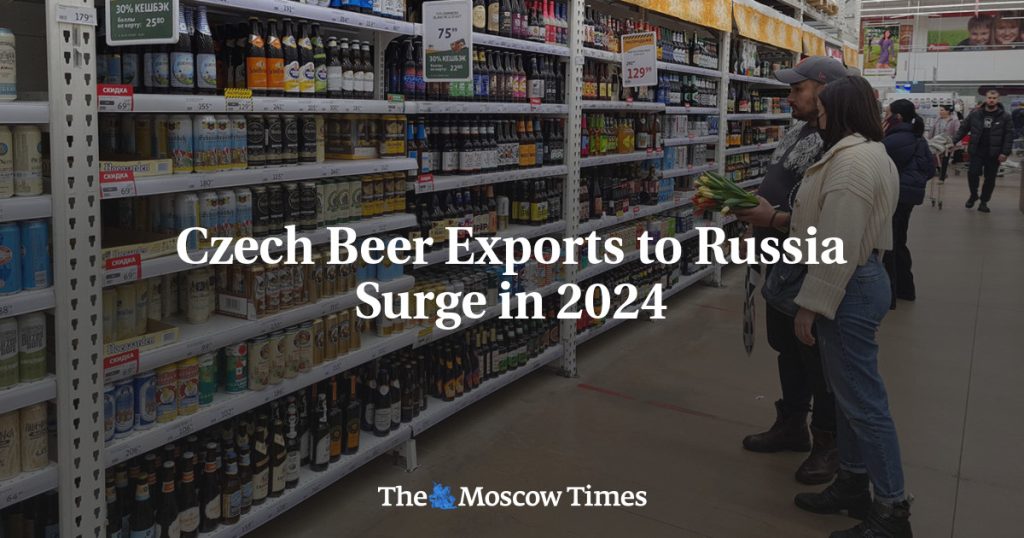Summarize this content to 2000 words in 6 paragraphs
The Czech Republic’s beer exports increased year-on-year in 2024, the first spike in beer exports to Russia since a slump caused by Moscow’s 2022 full-scale invasion of Ukraine and the subsequent severing of business links to Russia.
Although the Czech Beer and Malt Association denies that its member breweries exported to Russia after 2022 and says that it cannot control trade carried out by middlemen, the Czech Statistical Office (CZSO) insists its figures are correct.
“If the goods made it to Russia through other countries, then it is not possible to trace it in the foreign trade figures. CZSO always knows only the first country to where the goods are exported,” CZSO spokesperson Jan Cieslar was quoted as saying by the Czech Press Agency.
Cieslar added that “information is not available to CZSO” when the goods are exported to third countries.
The country’s major breweries, including Pilsner, Staropramen, Budvar and Heineken’s local branch, told the online news outlet Seznam Zprávy that they do not export directly to Russia, which is also seen as a risky destination.
“On long-term bases, we consider Russia, in light of the unstable business environment and bad rule of law conditions for Czech entities, as an unsuitable destination for Czech companies,” Industry and Trade Minister Lukáš Vlček told Seznam Zprávy on Tuesday.
Czech beer exports to Russia from January-October 2024 amounted to CZK819 million ($33.3 million) — an increase of 12.4% y/y compared to the CZK728 million ($29.6 million) that it exported in 2023, according to CZSO.
This makes Russia the third-largest beer export destination after Germany and Slovakia, the Czech Press Agency noted. It added that the Russian state-run RIA Novosti news agency described the Czech Republic and Germany as the two largest beer importers to Russia.
The Czech Republic exported CZK2.15 billion worth of beer to Germany and CZK1.64 billion worth to Slovakia from January-October 2024. Along with Russia, Poland is the only other destination where the volume of exports exceeded CZK0.5bn.
The news of increased beer exports to Russia reinvigorated the reporting of more goods registering a spike in exports to Russia even though the overall volume of exported goods to Russia continues to fall.
Seznam Zprávy wrote that the volume of exported organic chemicals increased from January-October 2024 by 39.9% y/y to just over CZK2 billion.
Furniture and hospital beds spiked by 144.1% to CZK0.54 billion, plastic products by 34.8% to CZK71 billion, and oil seeds such as poppy seeds by 35.2%. to CZK0.42 billion.
Two Czech hospital bed producers — Linet and Proma Reha — told Seznam Zprávy that they are not exporting any products to Russia, while Pavel Cihlář, the chair of the Czech poppy association, told the outlet “I don’t know who exports there [to Russia].”
Russian-linked businesses inside the Czech Republic — which has traditionally been a popular destination for Russian elites, who purchased lucrative real estate in prime locations and sent their children for schooling there — also remain active.
Investigative website Page Not Found reported this week that Russian discount retail chain Mere, which is facing sanctions in Ukraine, is opening a fifth warehouse in the Czech Republic.
Mere has launched its expansion in the outskirt regions of northern Bohemia, which are struggling with high unemployment and the hoist of social issues. It opened its first store in 2019 in the northwestern town of Most, whose continued struggles to catch up with the rest of the country bne IntelliNews covered last year. The latest store is to open in the regional capital Ústí nad Labem.
In a twist of irony, Mere is taking advantage of hundreds of thousands of Ukrainians who fled to the Czech Republic and were quickly absorbed by manual and low-paid jobs in the labor market designed to swallow a cheap workforce.
Jiří Mazánek, the head of the National Agency to Combat Organized Crime (NCOZ), told Seznam Zprávy in an interview this week that NCOZ is addressing “several cases linked to sanctions” against Russia.
“It is organized crime of Russian type involving, of course, other countries in the region,” Mazánek said, adding that “we are afraid Czechia serves to launder dirty money and that our legislation is weak in this” regard.
This article was originally published by bne IntelliNews.


